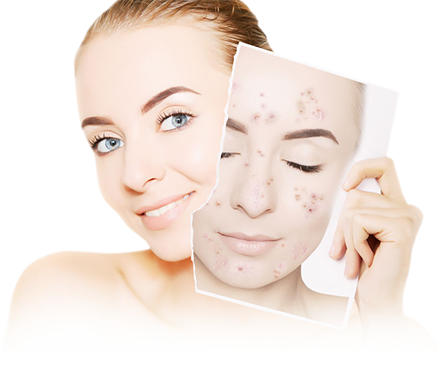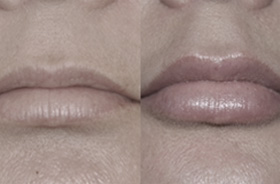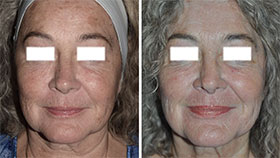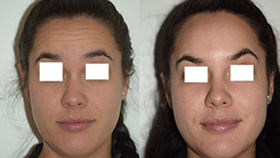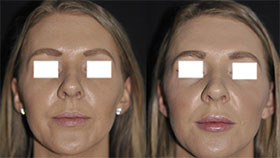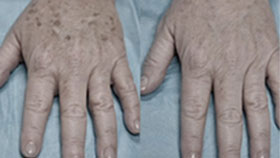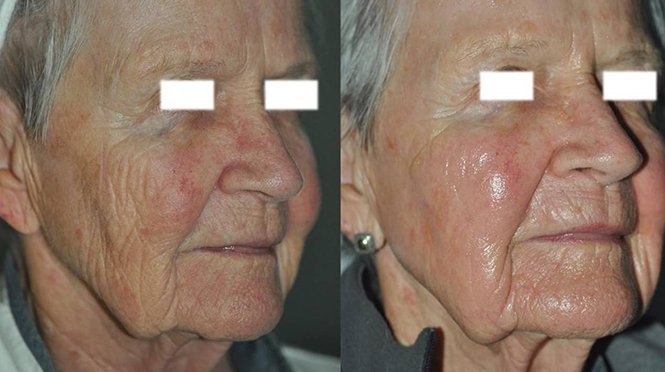Dermatological Conditions
Treatment and Management for a Range of Medical Issues in Marco Island, Bonita Springs, Ft. Myers, and Naples, FL
In addition to acne, skin cancer, rosacea, and psoriasis, Skin Wellness Physicians offers medical dermatology services for numerous other dermatological conditions in Naples, FL.
Contact Skin Wellness Physicians about diagnosing, managing, and treating dermatological conditions in Naples, FL, and Marco Island. Arrange a consultation by sending a message online or calling (239) 732-0044.
Actinic Keratoses
Considered to be "pre-cancerous" lesions, actinic keratoses are crusty areas where the skin has been damaged due to sun exposure. If left unchecked, this dermatological condition can develop into skin cancer, which is why rapid diagnosis and treatment is important. Fortunately, a range of treatments is available, with options that include topical medications, "freezing," chemical peels, surgery, and lasers.
Allergies
A person's allergies may cause any of a number of symptoms, including rashes, itchiness, and other skin-based symptoms. A dermatologist can help identify the trigger and recommend what to avoid, as well as medications for treating the dermatological conditions as desired.
Eczema
Like many dermatological conditions, eczema is a chronic condition that has no cure—though the symptoms can be managed. An estimated 30 million Americans deal with eczema, experiencing flare-ups that range from mild to severe. There are many variations of the condition, but a commonality tends to be itchiness. Eczema may also involve skin redness, sensitivity, dryness, scaling, crusting, or swelling.
Patients can be given treatments—including topical medications—to soothe these symptoms, as well as advice on how to minimize the chance of future flare-ups. For more severe cases of eczema, systemic medications are available.
Melanoma
The most common forms of skin cancer are basal cell and squamous cell carcinoma, both of which are highly treatable—especially if diagnosed and treated earlier rather than later. Melanoma is a rarer form of this serious dermatological condition, but though it makes up only about 4 percent of diagnosed skin cancers in the U.S., it is the most fatal, responsible for about 75 percent of all skin cancer-related deaths. Early detection is crucial to maximize the chances of a successful recovery. Patients should schedule regular skin checks with a dermatologist, and suspicious moles, lesions, and similar dermatological conditions should be closely examined as soon as possible. The Skin Wellness Physicians team can explain more about treatment options from there.
Meet our Dermatologists

At Skin Wellness Physicians, our dermatologists are board certified and thoroughly experienced in a range of medical and cosmetic treatments.





Melasma
Though these pigmented patches can impact anyone, this seemingly hormone-related dermatological condition is mostly associated with pregnant women, oral contraceptive use, and people who have had significant sun exposure. The brown or gray areas typically fade on their own over time, but treatments are available.
Skin Tags
Skin tags, medically known as acrochordons, are benign growths that commonly develop on areas where skin rubs against clothing or other skin. High friction areas include the neck, armpits, and groin. These small, soft, flesh-colored growths are typically harmless, although they can sometimes become irritated or inflamed. While the exact cause of skin tags is not fully understood, factors such as genetics, obesity, and hormonal changes may play a role in their formation. Skin tags can be easily removed by a dermatologist using any of several methods, including cutting, freezing, or cauterizing. it's important to have any new or changing growths evaluated by a dermatologist to rule out underlying conditions or concerns. Early detection and treatment can help prevent any potential discomfort or complications associated with skin tags. Note that insurance doesn’t cover skin tag treatments, so removal often incurs an out-of-pocket charge.
Moles
Though moles (medically known as nevi) are often nothing more than benign pigmented skin lesions, they can develop into a more serious dermatological condition: cancer. Given that possibility, it is important to pay attention to moles on the face or body to watch for possible signs of the presence of cancer cells. Any mole that is asymmetrical, has an irregular border, is multicolored, has a diameter larger than a pencil eraser, or is changing over time should be shown to a dermatologist so it can be checked for cancer cells. Moles can be removed in a number of ways—even for strictly cosmetic reasons.
Seborrheic Dermatitis
This dermatological condition is most commonly found on the scalp, and can also appear in areas where skin tends to be oily, such as the nose and elsewhere on the face. Seborrheic dermatitis is referred to as "cradle cap" when it affects babies; most adults know it as the cause of dandruff. In addition to creating annoying flakes found throughout the hair and on the shoulders, it can cause crusty patches of red, scaly skin. Treatments for this dermatological condition often involve specific shampoos or topical products.
Sun Damage
Ultraviolet radiation can damage and destroy healthy skin cells and hasten the depletion of important proteins, carbohydrates, and other molecules in the skin. The resulting problems can be cosmetic or medical dermatological conditions, but are often a combination of the two. With effects ranging from fine wrinkles to cancer, sun damage is best avoided through preventative measures and monitored through regularly scheduled skin checks by a dermatologist.
Call (239) 732-0044 or send a message online to arrange a consultation to discuss dermatological conditions in Naples, FL, and Marco Island at Skin Wellness Physicians.

